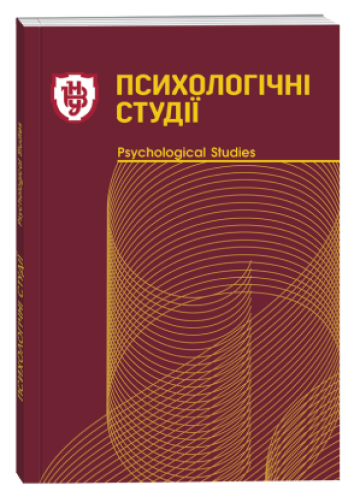TRENDS AND SCIENTIFIC DIRECTIONS OF MODERN AND CLASSIC IDEAS ON THE FORMATION OF LEGAL AWARENESS OF YOUNG PEOPLE
DOI:
https://doi.org/10.32782/psych.studies/2023.2.24Keywords:
legal awareness, law schools, young people, formation of legal awareness of young people, areas of law study.Abstract
The application of law, which determines the functioning of legal concepts, is based on an understanding of the essence, elements, mechanisms and procedures. The purpose of the study is the analysis and systematization of ideas about legal awareness in the context of its understanding within the framework of modern and classic ideas, concepts of schools and provisions, determination of the main trends, directions and perspectives of research. The task of the research is to carry out a systematic analysis of the main directions and schools of law research and legal phenomena, the study of scientific ideas about legal consciousness, the analysis and comparison of various positions on the study of legal consciousness, the study of the strengths and weaknesses of each concept. There are such schools and areas of understanding law and legal awareness. School of natural law. The divine right, the perfect idea of the world and the place of man in this world, given from above, is presented a priori as being built on the principles of harmony and understanding, and only the human will, which goes against its own convictions of conscience and decency, violates this order. The state is recognized as a collective mind in the form of a lawmaker, which seeks to understand the existing order, but it is not possible to do this in full, since it is built according to laws higher than the laws of man and the level of his understanding. Within the framework of the theory of natural law, the main directions are: psychological, sociological, historical. The Ukrainian philosophical and legal school defines law as the result of a transcendental or divine order of being; the nature of the spirit, the desire for an ideal and justice, which, however, cannot be realized because it is built within the framework of the changing state and legal reality. The positivistic school of law has the following directions: normative, juridical-positivist, statist. The school of legal positivism defines by its characteristics: law is state coercive decrees in the form of universally binding norms and rules regardless of their content, law and law are defined as a single whole and it is positive when it is written, the positivity of law is determined by the fact that it is actually active We can talk about law and legal awareness as a natural or social formation, which is determined by social needs and opportunities to ensure the implementation of universally binding norms.
References
Legatum Institute. The Legatum Prosperity Index A tool for transformation. London. United Kingdom. 2021. URL: https://nonews.co/wp-content/uploads/2021/12/PI2021.pdf
Алаіс С.І. Проблема праворозуміння в основних школах права. Інститут держави і права ім. В.М. Корецького. Київ. 2002. 203 с.
Вовк В.М., Олійник У.М. Методологічні засади дослідження права на свободу думки, совісті та релігії. Філософські та методологічні проблеми права. 2019. № 2. С. 27–35.
Бреусенко-Кузнецов А.А. Інтегративно-гуманістична персонологія Г.А. Балла. Вісник Національного технічного університету України «КПІ». Філософія. Психологія. Педагогіка. 2016. 3. С. 87–92.
Бариська Я.О. Природно-правова і позитивістська школи права: порівняльний аналіз основних позицій. Науковий вісник Ужгородського Національного університету. Серія «Право». Ужгород : Видавничий дім «Гельветика», 2018. № 1. 49. С. 9–13.
Братасюк М. Природно-правовий підхід у контексті сучасного правничого методологування. Публічне право. 2013. № 4 (12). С. 203–209.
Білозьоров Є.В., Власенко В.П., Горова О.Б., Завальний А.М., Заяць Н.В. Теорія держави та права. Київ : НАВС, Освіта України, 2017. 320 с.
Буглай Є.В. Дуалізм «природнього» та «позитивного» права як філософська проблема. Проблеми філософії права. 2003. № 1. С. 83–85.
Данильян O.Г., Дзьобань O.П., & Максимов С.І. Філософія права. 2009. Харків : Право, 208 с.
Грищук O.В. Людська гідність у праві: філософський аспект. Львів. 2007. 415 с.
Ґадамер Ґ-.Ґ. Істина і метод. К. Юніверс. Том 1. Герменевтика І. Основи філософської герменевтики. 2000. 464 с.
Калиновський Ю.Ю. Правосвідомість українського суспільства: ґенеза та сучасність. Харків : Право. 2008.
Корнієнко В.В. Загальне та особливе у природно-правовому мисленні. Форум права. 2008. № 2. С. 256–260.
Лук’янова І.Ю. Правове пізнання як основа праворозуміння. Науковий вісник Міжнародного гуманітарного університету. 2015. № 18. С. 7–9.
Максимов С. Природне і позитивне право як елементи правової реальності. Вісник Академії правових наук України. 2002. № 1 (28). С. 82–92.
Максимов С. (ред.) Велика українська юридична енциклопедія. Нац. акад. прав. наук України. Харків : Право, 2017. 1128 с.
Рабінович С.П. Природно-правові підходи в юридичному регулюванні. Львів : Львівський державний університет внутрішніх справ. 2010. 576 с.
Цвік М.В., Ткаченко В.Д., Богачова Л.Л. Загальна теорія держави і права. Харків : Право. 2002. 432 с.
Хлонь О.М. Ефективність професійної правоохоронної діяльності як запорука формування правосвідомості молоді. Вісник Національного університету оборони України : збірник наукових праць. Київ. НУОУ. 2021. № 6 (64). С. 144–154.







